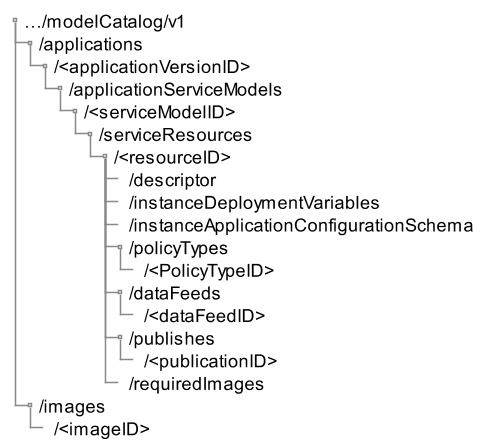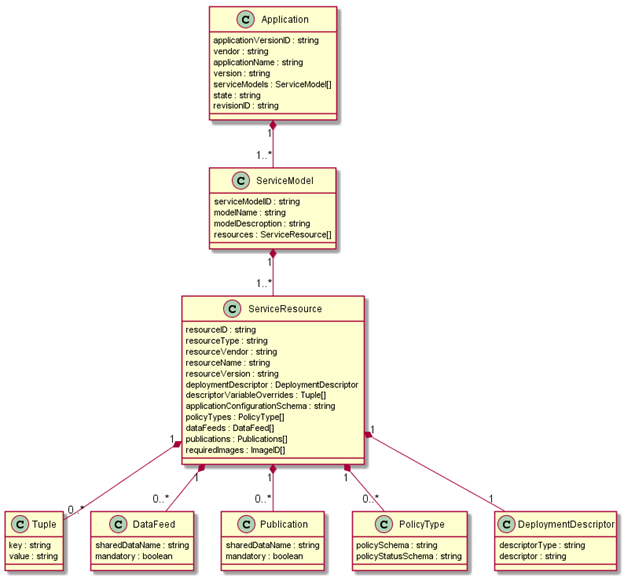SMO - Model Catalog
The Model Catalog provides a list of Applications that are onboarded to the SMO after delivery of an "Application Package" from a vendor. It presents a Model-View-Controller for management of the data.
For the purposes of this implementation we will assume the following:
- The Controller will be RESTful from the service endpoint of {apiRoot}/ModelCatalog/v1. The initial REST resource tree is show below. Additional resources may be added to represent aspect of ML Applications which have additional data elements.

Click here to view PlantUML...
@startsalt
{
scale 1.5
{T
+…/modelCatalog/v1
++/applications
+++/<applicationVersionID>
++++/applicationServiceModels
+++++/<serviceModelID>
++++++/serviceResources
+++++++/<resourceID>
++++++++/descriptor
++++++++/instanceDeploymentVariables
++++++++/instanceApplicationConfigurationSchema
++++++++/policyTypes
+++++++++/<PolicyTypeID>
++++++++/dataFeeds
+++++++++/<dataFeedID>
++++++++/publishes
+++++++++/<publicationID>
++++++++/requiredImages
++/images
+++/<imageID>
}
}
@endsalt
- The Model is represented in the class diagram below

Click here to view plantUML
@startuml
Class Application {
applicationVersionID : string
vendor : string
applicationName : string
version : string
serviceModels : ServiceModel[]
state : string
revisionID : string
}
Class ServiceModel {
serviceModelID : string
modelName : string
modelDescroption : string
resources : ServiceResource[]
}
Class ServiceResource {
resourceID : string
resourceType : string
resourceVendor : string
resourceName : string
resourceVersion : string
deploymentDescriptor : DeploymentDescriptor
descriptorVariableOverrides : Tuple[]
applicationConfigurationSchema : string
policyTypes : PolicyType[]
dataFeeds : DataFeed[]
publications : Publications[]
requiredImages : ImageID[]
}
Class Tuple {
key : string
value : string
}
Class DataFeed {
sharedDataName : string
mandatory : boolean
}
Class Publication {
sharedDataName : string
mandatory : boolean
}
Class PolicyType {
policySchema : string
policyStatusSchema : string
}
Class DeploymentDescriptor {
descriptorType : string
descriptor : string
}
Application "1" *-- "1..*" ServiceModel
ServiceModel "1" *-- "1..*" ServiceResource
ServiceResource "1" *-down- "1" DeploymentDescriptor
ServiceResource "1" *-down- "0..*" Tuple
ServiceResource "1" *-down- "0..*" PolicyType
ServiceResource "1" *-down- "0..*" DataFeed
ServiceResource "1" *-down- "0..*" Publication
@enduml
The Application record in the Model Catalog follows a Stateful lifecycle. The State can be updated with a partial update (PUT) as long as the current revisionID is supplied as a query parameter. Upon a successful update the revisionID will be changed by the system to a newly generated value.
The valid values for State are "VALIDATED", "TRAINING_REQUIRED", and "AVAILABLE". The state transitions allowed are:

Click here to view plantUML...
@startuml
[*] -> VALIDATED
VALIDATED : The validated package is sequestered into the catalog. This protects the process from a
VALIDATED : non-validated package from being supplied to the cataloging step that is different from the
VALIDATED : one provided on the validation step.
VALIDATED -down-> TRAINING_REQUIRED : ML detected
VALIDATED -> AVAILABLE : No ML
TRAINING_REQUIRED -> AVAILABLE : Training Complete
AVAILABLE -> TRAINING_REQUIRED : Retraining Required
TRAINING_REQUIRED : Training Iteration is tracked. It is initialized with a zero at validation.
TRAINING_REQUIRED : During training multiple training iterations may be applied.
TRAINING_REQUIRED : Therefore the count returned from training may increment by
TRAINING_REQUIRED : more than one. How we manage the availablity for different
TRAINING_REQUIRED : trained instances is FFS. For now only the latest trained
TRAINING_REQUIRED : version is "AVAILABLE".
AVAILABLE : This is an application in which the Run-Time can create a configuration for.
AVAILABLE : However, we may need to consider training iteration count as after a
AVAILABLE : configuration is created, additional training might become required
AVAILABLE : a determination needs to occur as FFS if we invalidate existing configuration
AVAILABLE : which raises a question on "RUNNING" instances. Or do we allow the
AVAILABLE : deployment of any iteration that reaches the AVAILABLE state.
@enduml


